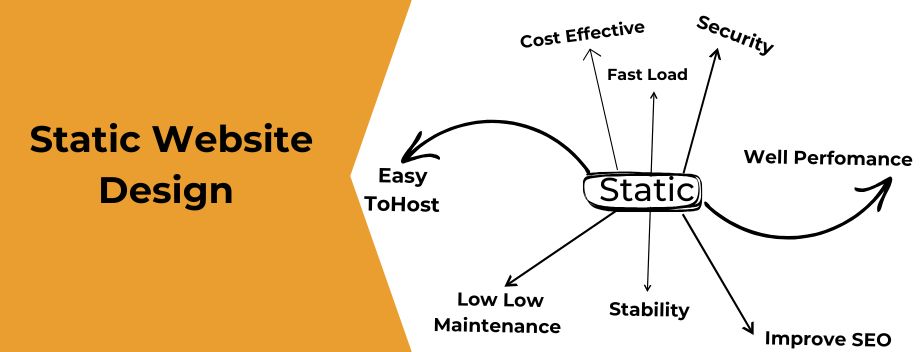
A static website is a website that holds a set of fixed content before presenting them to all the users. Unlike dynamic sites that modify content according to visitor action or input, these sites are pre-built into HTML, CSS, and some cases with JavaScript. Static sites then serve pages "as-is" to its visitors. Static websites then tend to load faster as well as be easy to keep updated.
Static websites are best for the kind of Design that have little or no need for frequently updated content. Speed, security, and deployment ease make static sites great for small businesses, personal portfolios, and informative websites.
Design Your Website
Draw all your pages. For static sites, that will be pretty simple, so take extra care over clean, professional design.
HTML and CSS
HTML will form the backbone of your website. Then, there's CSS to style things out, and then there is the need for a dash of JavaScript for something that you really need interactive but not any sort of complicated functions to be just plain static.
Optional Static Site Generator
Jekyll, Hugo, Gatsby and others can produce the static files for you. If you have a blog or have templated content, this is especially handy.
Hosting Your Site
Deploy to GitHub Pages, Netlify, or Vercel. These hosts are built for static sites and often have free tiers.
If your project is simply a site that doesn't require frequent updates, then you might be well served with a static website. Here's why:
1. Cost
A static page design for a website is cheaper to build than a dynamic website because it takes less time and fewer resources to build.
Static sites load fast because they are made up of pre-rendered HTML files and can thus be served directly to a browser. This, on the other hand, boosts good user experience; besides this has the potential of aiding in search engines.
3. Security Benefits
Static sites do not suffer from the significant number of attacks dynamic sites undergo in comparison since they do not rely upon databases or external plugins in which hackers can find room to play.
4. Easy Hosting
Static website hosting is easier and even cheaper since they don't use a server with complicated settings.
5. Less Maintenance
Once the static website is created, it demands little maintenance. They don't need to be updated for software and don't need plugins as well as regular backups.
6. Reliability and Stability
Static websites tend to be stable and less prone to problems because they are not dependent on database connections and server-side processing.
7. Better SEO for Small Websites
Static websites load very fast and are less complex. They can work for small websites that are updated very seldom in terms of SEO.
8. Good for Specific Type of Websites
Static web pages design are suitable for publishing content or portfolio sites, landing pages, and even simple brochures. This is because they do not need to be updated regularly.
| Feature | Static Website | Dynamic Website |
| Content | Pre-written HTML, displays the same content | Content may change based on user interactions |
| Speed | Very fast as no processing is needed | Slower due to server-side processing |
| Maintenance | Easier, as content does not change frequently | Requires regular updates and maintenance |
| Best Suited For | Portfolio sites, blogs, informational sites | E-commerce, social media, forums |
| Hosting Cost | Generally lower | Higher due to server requirements |
| Security | Higher, fewer vulnerabilities | More susceptible to security issues |
You can find many free static website designs online that you may use as templates or ideas for your site. Here are a few popular sources:
There is a time when you must choose between a static website and a dynamic website development depending on the needs of your project:
Choose Static if your content is relatively simple and doesn't require constant updating. It's ideal for portfolios, small business sites, personal blogs, and informational pages.
Dynamic should be chosen if your website requires interaction from the users, real-time data, or frequent updates. There are also e-commerce platforms, social media networks, and large-scale publishing sites to name a few examples.
Static websites are a really reliable, secure, cost-effective solution for many types of web projects, most of which have simpler requirements. They load really quickly and require very little in the way of maintenance so they're great for simple portfolios, informational websites, or small business sites. Because creating a static website using platforms like GitHub Pages or Netlify is easier than ever.
Q- What are the main advantages of a static website?
Ans- The static website is very fast, secure, economical, and easy to maintain; because it loads fast, less security risks are present and no databases are needed as well as complex server-side processing.
Q- Who would require a static website?
Ans -Static sites best suit small businesses, portfolios, personal websites, or information-based websites that one doesn't need to change too often.
Q- Which technologies are used in building a static website?
Ans- The basic structure is always in HTML, and one will have CSS for all styling needs, while some JavaScript would be used if needed to make the webpage dynamic. Usually, one builds a static site on such services as GitHub Pages, or Netlify for convenience of deploying the website.
Q- How much does a static website cost?
Ans- A static website is less pricey compared to the dynamic websites since they are simpler in design and require no development of backend. Price would depend on how complexly designed the site is as well as how many pages are to be developed.
Q- Can I have a mobile-friendly static website?
Ans- Yes, you may make static websites mobile friendly through the use of responsive design techniques so that the site would look great as well as work fine on whatever device used.
Q- Can I update a static website myself?
Ans- Yes, you can. However, normally it will need knowledge of HTML and CSS. Some developers will give simple instructions or templates or you can even use static site generators.
Q- Do static websites rank well in search engines?
Ans- If they are done correctly, static websites do rank pretty well on the search engines, with keywords, metadata, and structuring the content.
Q- Is a static website secure?
Ans- Yes, static websites are very safe because no database nor server script is involved, thus there are fewer hacking and data breaches.
Q- Does a static website have any interactive?
Ans- Yes, interactive elements, such as forms, can be added using JavaScript. More interactivity would be included in a dynamic website.
 Kanhu Charan Behera
Kanhu Charan Behera
Copyright @2020. All Rights Reserved by WEB DIGITAL MANTRA IT SERVICES PVT LTD
Post Reviews